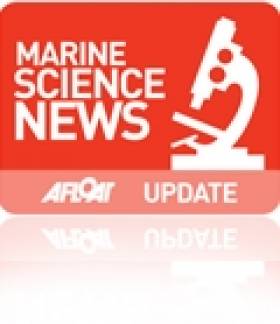Displaying items by tag: Swansea Neath Ospreys
Ferry Operator Assists in Marine-Life Conservation Role
Fastnet Line which runs the Cork-Swansea port route on the Celtic Sea, is assisting the charity MarineLife to monitor cetaceans, writes Jehan Ashmore.
The work of MarineLife is to survey the population trends and track the movements of dolphins, whales, porpoises and other wildlife. The research is undertaken onboard Fastnet Line's Julia (1981/21,699grt) and access to the ferry is provided free-of-charge to the wildlife-based charity.
During the months of July and August the ferry's schedule will allow for further opportunities to conduct daylight sightings of marine-life which is to be posted on MarineLife and Fastnet Line websites.
Adrian Shephard, Chairman of MarineLife Trustees, said: "The route from Swansea to Cork crosses a range of marine habitats and we hope it will generate many sightings of cetaceans and seabirds, including two important species we monitor, the white-beaked dolphin and the balearic shearwater".
In addition monitors recently observed fin whales, the second largest whale on the planet. Such sightings provide vital information and this will contribute to a better understanding of the distribution of cetaceans and other marine life in the Celtic Sea. To read more www.marine-life.org.uk
The first of four summertime surveys is to take place on 10 July. Overall the research by MarineLife is part of a larger project which also involves the use of other ferries operating in the Irish Sea and those serving on UK continental routes.
The 1,500 passenger / 325 car-carrying Julia sails year-round six times a week between September to June and from next month and during August the vessel will provide eight sailings per week. For fares and sailings schedules contact www.fastnetline.com
Fastnet Ferry Figures Smash 2010 Target
The passenger figure represents four-times the capacity of the Liberty Stadium, Swansea which is to host the rugby Heineken Cup clash between Swansea Neath Ospreys and Munster on Saturday 18 December.
The 10-hour ferry service operated by Fastnet Line also carried 31,000 vehicles and statistics suggest a significant boost for the Swansea Bay economy with about 40% of all passengers so far travelling from Cork to the south Wales region. The route is served by the MV Julia which had been sailing in the Baltic. The 1982 built vessel is capable of carrying more than 1,800 passengers and 400 cars.
Fastnet Line will run all-year-round in 2011 and has set a revised target of 120,000 passengers.
On a seasonal note, Christmas gift vouchers are available from Fastnet Line, for more information logon HERE
Ferry Special 'Munster Rugby' Sailings
After the match supporters can take the bus from Swansea city centre to the ferryport, with departures on the hour at 19.00, 20.00 and 21.00hrs. Passengers check-in times at the terminal are from 19.00hrs and up to 2200hrs. The return sailing departs at 2350hrs on Saturday 18 December and arrives into Cork at 1400hrs on Sunday 19 December.
For information on prices contact Fastnet Line Tel: (021) 4378892 or logon to www.fastnetline.com





























































